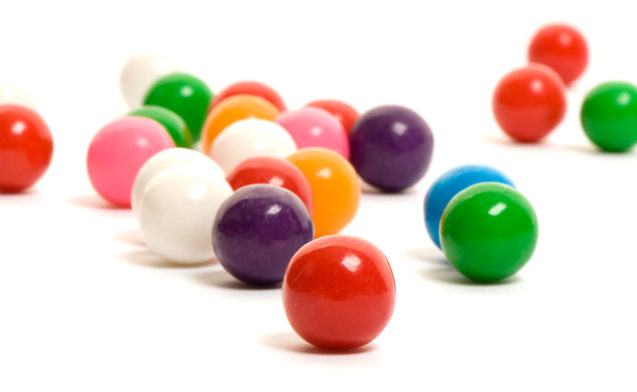Last month, we looked at foods and drinks that can stain your teeth, but whiteness isn’t the only measure of healthy teeth. There are lots of foods that can chip your teeth or damage dental work in your mouth when you eat them. What are some of these problem foods? Your Lancaster, CA dentist can warn you about some of the biggest culprits when it comes to chipped teeth, loose fillings, and broken crowns.
Ice
On a hot summer day, it’s great to fill a tall glass with ice and pour in some soda, lemonade, or tea to help cool down. You’re right if you assume that sugary drinks are bad for your teeth (they are!), but they’re bad in an over-the-long-term kind of way. In fact, lemonade and soda are also quite acidic, which isn’t good for your tooth enamel, either. However, it’s the ice that can actually chip your teeth if you chew it. Other hard foods can damage your teeth, too, so be careful when you’re eating things like baguettes, hard pretzels, and biscotti.
Popcorn
Lots of people enjoy buttered popcorn while sitting in a cool, air-conditioned movie theater, but unpopped kernels can definitely ruin the fun. They’re hard enough to chip a tooth if you crunch down on one of them by accident or on purpose. However, popcorn actually poses a double threat. The thin shell that covers the kernel can actually get stuck between your teeth or between your tooth and gum, giving bacteria a source of food and promoting tooth decay.
Fruits with pits
What do olives, cherries, dates, and peaches all have in common? They all have pits, of course, and those pits can damage teeth. If you accidentally bite into a pit, you can definitely crack or loosen a crown—or damage regular tooth enamel.
Candy
Pretty much every type of candy can damage your teeth. Hard candies can chip teeth if you bite on them or chew them up; if you suck on them and let them dissolve slowly, you’re basically giving your teeth (and the bacteria in your mouth) a sugar bath. Chewy candies, like caramels or taffy, can stick to your teeth, increasing the risk of cavities, or stick to fillings and crowns, loosening them.
But sour candies are probably the most damaging of all because they combine three dangers to your teeth all in one. They’re loaded with sugar and they stick to your teeth, but the sour flavor actually comes from acids, which eat away at tooth enamel.
You’re probably noticing a theme by now. Hard foods can damage your teeth. We’re not trying to you away from enjoying the sorts of treats you love. However, if you’re eating something that could chip your teeth, pay attention while you’re eating it. If you’re eating something that could damage your teeth in another way, remember to drink some water to rinse out sugars and acids. And always brush your teeth and floss after you’ve eaten any of the foods on this list.
If you’ve damaged a tooth or lost a filling because of something you ate, give your Lancaster, CA dentist a call at 661.952.7865 to make an emergency appointment. Come on in, and we can get your damaged tooth fixed right away!
More
By admin
15 Aug, 2016
Dental Health, Dental Tips, General Dentistry, General Health, Lifestyle, Oral Health
bruxism, dental health, stress, stress relief, teeth clenching, TMD, TMJ
Stressed Out: Can Stress Affect Your Teeth?
You have too much to do at work. You have to juggle a million tasks between your children, your spouse, and errands — not to mention your mother-in-law is in town for the weekend. We all have those days, and those days can add immense stress to your life. That stress affects more than just your emotional health; it physically alters you as well.
Physical Symptoms of Stress on Your Mouth
Your mouth already experiences daily wear and tear that you need to prevent as much as possible. If you are too stressed, this adds another layer of factors fighting against the health of your mouth. It starts before you even realize — you are stressed out thinking about everything you need to do, and then you notice you’ve been clenching your teeth for the past few minutes. Depending on how you handle stress, you may be doing this multiple times per day, which takes a toll on your mouth.
Stress-related clenching and teeth grinding (also called bruxism) can carry into the night while you sleep. If left untreated, bruxism can also destroy dental restorations (fillings, crowns, bridges, etc.) that you’ve had done, creating more pain and costing more money. Additionally, this can lead to temporomandibular joint disorders (TMJ/TMD). Symptoms can include:
- Constant headache
- Sore jaw muscles
- Sensitive teeth
- Extra tooth wear
How to Prevent Teeth Grinding and Clenching
Since one of the main causes of teeth grinding and clenching is stress, the best way to stop is to reduce your stress. Hold on — put down that glass of chardonnay or moonshine you have after work to unwind (alcohol increases the likelihood of teeth grinding while sleeping). Here are some stress-management techniques that will help reduce your overall stress.
- Exercise. Not only does this release endorphins to help combat stress, but at the end of the day, you’ll be too tired to have stress-inducing thoughts.
- Autogenic relaxation. This method involves “commanding” your body to relax. This takes a lot of practice but can be very effective once learned. Learn more about autogenic relaxation here.
- Visualization. Trying to use all five of your senses, imagine a scenario that is relaxing. For example, if you imagine yourself in a forest, listen to the sway of the branches, feel the warm light creeping between the trees, and note the scent of pine needles.
- Listen to your favorite music. Classical is always a reliable genre to relax to, but listen to the type of music that helps you unwind.
These techniques will only work if you allow them to. When using them, ensure you have an open mind and allow yourself to relax. Everyone is different, and it will take time to find what relaxes you, as well as mastering the technique itself. The benefits of stress-management strategies will not only help your teeth-grinding issue but also provide benefits for many other health issues you may be experiencing.
Other Stress Reducing Tips to Consider
- If you notice throughout the day that you are still clenching, stick the tip of your tongue between your teeth. This will force you to relax your jaw muscles.
- According to the TMJ Association, take anti-inflammatory medicine (such as ibuprofen) to help with swelling and pain until you can get your teeth grinding and TMJ/TMD under control. Check with your physician to see if you are able to take anti-inflammatory medicines.
- Place a warm washcloth on your jaw before you go to bed to help relax your muscles.
If you try these stress-relieving techniques and are still experiencing pain related to clenching and grinding, your Lancaster, CA dentist can do an examination to determine the best course of action. In most cases, your dentist can create a mouth guard/splint to prevent clenching and grinding.
Additional Dental Services May Include:
- Managing pain with a special diet
- Stretching exercises
- Anti-inflammatory medications
For more information about stress and your dental health, request an appointment at Douglas B. Weber by calling (661) 952-7865 today.
Reference:
Stress management. (n.d.). Retrieved July 12, 2016, from http://www.mayoclinic.org/healthy-lifestyle/stress-management/in-depth/relaxation-technique/art-20045368
Teeth Grinding (Bruxism): Causes and Treatments. (n.d.). Retrieved July 12, 2016, from http://www.webmd.com/oral-health/guide/teeth-grinding-bruxism
TMJ Association, Ltd. (n.d.). Retrieved July 13, 2016, from http://www.tmj.org/site/page?pageId=257
More
By admin
08 Feb, 2016
Dental Health, Dental Tips, General Dentistry, Lifestyle
children's dentistry, dental health, gifts, healthy smile, pediatric dentistry, tooth-friendly treats, toothbrush, valentine's day

Nothing Is Sweeter Than a Healthy Smile
Valentine’s Day is a holiday that can leave many parents feeling conflicted. Anything that gives you an excuse to spoil your kiddos with gifts and tell them how much you love them is a welcome retreat from the daily grind of handing out chores and pushing through homework. One daily parenting task that commonly elicits dread is convincing your children to brush their teeth. Every parent knows how important their children’s oral health is, and instilling solid early oral hygiene practices so that your kids can enjoy a lifetime of healthy smiles is even more important. Thus the downside of Valentine’s Day: all the sugary treats.
Valentine’s Day is almost as notorious a threat to your kids’ teeth as Halloween. They inevitably come home from their classroom celebrations with paper bags full of chocolate and handfuls of candies with messages of love written on them. While these lovely confections please your kids, they are anxiety inducing when you catch yourself considering the damage being done to your children’s tiny pearly whites.
That’s not to mention the difficulty you face when trying to figure out gifts to give them and Valentines they can give to their friends and classmates that won’t cause cavities. While you can’t control what they will be bringing home, you can skip on contributing to acts of love that promote decay. Below we have put together four DIY, tooth-healthy Valentine’s Day gift ideas that show love while also producing happy, healthy smiles.
“You Make Me Smile” Toothbrush Valentine (Adapted from Time 2 Save Time 2 Give): This Valentine is simple to make and sends a sweet message while promoting good oral hygiene habits. You will need child-friendly toothbrushes, ribbon, colored paper, and a marker. Simply cut small hearts out of the paper and write a Valentine’s Day message like “You Make Me Smile” on each one. Attach ribbon to the back of the heart with tape and tie it to a toothbrush (still in package). You children’s classmates won’t be the only ones grinning! You can bet their parents will be feeling the love too.
Paper Airplane Valentine Free Printable (From NoBiggie.net): NoBiggie.net offers a free customizable, printable airplane Valentine that is perfect for the future pilots in your family. It’s quick and easy to make with corresponding numbers to help guide your way, and there’s even a video tutorial to walk you through creating the airplanes, making this a great last-minute go-to if you’ve been procrastinating.
I’m Nuts About You Treat Bag Printable (From Design Dining Diapers): If your children just have to hand out yummy treats, bags of peanuts are perfect. This tooth-friendly treat is low in sugar and high in protein, and if you go to the Design Dining Diapers site and follow the instructions, you can download a printable tag that says “I’m Nuts About You” and use it to fasten shut your baggie full of peanuts, leaving your children with a fun, yummy Valentine to hand out to friends.
Lunchtime Love: Show your children how much you love them with a little lunchtime love. You can give your children yummy hearts that aren’t made out of chocolate. Most kitchen-supply stores carry stainless-steel sandwich cutters in a variety of shapes and sizes. Use heart-shaped cutters to turn a turkey sandwich in a friendly reminder that you care. Smaller cutters can be used for meat and cheese slices or to turn slices of melon into a juicy, red dessert.
Valentine’s Day doesn’t have to lead to decay; there are plenty of candy-less ways to celebrate love. If your children come home with bags full of sugary goodies, make sure they brush their teeth after every treat — and then call us to book an appointment for a cleaning.
Happy Valentine’s Day from all of the staff at Douglas B. Weber, DDS!
More
By admin
15 Dec, 2015
Dental Health, Dental Tips, General Dentistry, General Health, Lifestyle
bad breath, dental health, dental hygiene, fresh breath, holiday dental tips, oral health, oral hygiene

Mistletoe has been hung, setting blissful, kissing booby traps for the unsuspecting, and when the ball drops, lips will lock everywhere.
During the month of December, your oral health and hygiene needs to be on point!
Brushing and rinsing twice a day, as well as daily flossing, helps keep your mouth healthy but doesn’t necessarily ensure fresh breath that will last all day long. And during a season hallmarked by the unexpected, one does not want to be caught face-to-face suffering from a bad case of halitosis. So what can you do to improve your chances of being 100% smoochable should the opportunity arise? Read on for breath-saving tips that are sure to improve your chances of ringing in the New Year with more than a smile on your lips.
Food for Thought
When you eat, food is absorbed into your bloodstream and expelled out of your lungs when you breathe. This means that you may suffer from bad breath even when your diet is healthy and balanced. The following foods are notorious for turning breath foul, so ingest them sparingly or at least with extreme caution.
- Garlic: This powerful herb can turn a bland dish into a delectable culinary work of art. Its versatility allows it to be used in a variety of cuisines and eaten or used for cooking whole, crushed, chopped, or dried and powdered. Garlic is also renowned for its health benefits and its ability to ward off vampires. While it does all of these amazing things, its major drawback is its ability to turn the odor of your breath into a scent so repellant that even the most determined admirer would have great difficulty overcoming their repulsion long enough to plant a wet one on you. Also note: If eaten regularly and in large quantities, it can affect your body odor negatively as well.
- Onion: While onion is not as powerful as garlic, its fellow odoriferous bulb, this herb is commonly used to enhance the flavor of a large range of dishes. It is often served raw in salads, added to soups and other savory dishes, and comes in a large variety of types and flavors. The types of onion include brown onions, green onions, leeks, pearl onions, shallots, and more, and while they are all very different in appearance, texture, and flavor, they all have one thing in common: They make your breath stink.
- Coffee: Too much coffee gives you bad breath. It’s a hard truth to face, especially since dates at coffee shops are where many love stories begin. Coffee is wonderful at delivering a warm wake-up call each morning and nurturing its consumer into a state of alertness that allows them to take on the day. While this is a deeply appreciated trait, what few people realize is that it’s also one of the most dehydrating drinks you can consume. We aren’t suggesting that you quit coffee for good, but if you want the confidence that comes with fresh breath, you should limit your consumption to a cup a day.
- Alcohol: Don’t give up your Champagne toast at midnight on New Year’s Eve, but do watch your overall consumption of alcoholic beverages. That beer you look forward to at the end of each day and that weekly happy-hour cocktail you consume with your co-workers is drying out your mouth. When your saliva flow runs low, bad-smelling bacteria sticks around and turns breath bad.
Battle Bad Breath
There are a variety of simple ways you can actively ward off and battle bad breath on a daily basis.
- Stay hydrated: Drink water all day long. It washes away leftover food particles and the bacteria that can lead to decay, and it helps you avoid dry mouth. Aim for six to eight 8-ounce glasses of water a day.
- Clean your tongue: Residual buildup between your taste buds and the fold in your tongue can affect your breath negatively. Keep your tongue clean by brushing it regularly. You can also find very effective tongue scrapers at most drugstores.
- Chew gum: Sugarless gum with xylitol keeps your breath fresh while cleaning your teeth. Gum stimulates the flow of saliva, which washes unwanted debris from your teeth.
- Snack on this: Crisp, fresh fruits and vegetables turn on the flow of saliva and decrease the occurrence of bad breath caused by hunger. When you become hungry, especially when you are on calorie-restricted diets, the acids in your stomach build up and give your breath a nasty scent.
- Eat your garnish: Parsley is a popular garnish on many of the dishes served in restaurants. Most people think the only purpose it serves is to pretty up your plate. But parsley contains chlorophyll, which is a powerful breath and post-meal romance saver.
If you want to feel completely confident this holiday season, give your Lancaster dentist Dr. Douglas Weber a call at (661) 952-7865 and set up a cleaning. We will make sure your smile is New Year’s Eve ready, so you can enjoy kissing this year goodbye.
More
By admin
22 Nov, 2015
Dental Tips, General Dentistry, Lifestyle, Preventive Dental Care
dental health, healthy fall foods, healthy pumpkin prepration, healthy recipe, holiday dental tips, oral health, oral health benefits of pumpkin

Dentists Say, “Back Away From the Spiced Latte! But the Pumpkin Can Stay.”
It probably comes as no surprise that the Pumpkin Spice Latte is Starbucks’ most popular seasonal drink of all time. Everything about the pumpkin’s color, aroma, and savory flavor screams fall. Every year coffee enthusiasts eagerly await the release of this highly anticipated beverage, then flock to the coffee shop as soon as it becomes available. At least that is how it has gone for the better part of the last 12 years, since its inception in 2003.
But the Pumpkin Spice Latte isn’t your average cup o’ joe. Recently, the beloved libation has come under fire for the large amount of calories (380) and sugar (50g) it contains. Health and fitness professionals are urging people to consume it like they would any other dessert: in moderation. And while most health professionals are worried about the damage the Pumpkin Spice Latte can do to people’s waistlines, dentists are more concerned with the impact it could have on their patients’ teeth.
The bad news is that any way you look at it, the amount of sugar in your beloved Pumpkin Spice Latte, along with the length of time you spend sipping it down, is a recipe for tooth decay. The good news is that you can still satisfy your autumnal craving for pumpkin goodness by preparing and consuming it in different, delicious, healthier ways — and actually improve your dental and overall health while doing it.
Health benefits related to consuming pumpkin are plentiful. This vitamin-packed fruit can please both your nutrition/fitness professional and your dentist by protecting your teeth and whole health. Pumpkin provides:
- Zinc: Zinc is your mouth’s best friend. It plays a key role in healing wounds, which does wonders for damaged soft tissues inside your mouth, or gums that are healing from gingivitis-induced bleeding. Zinc is also considered an anti-plaque agent and is added to toothpaste to prevent buildup.
- Vitamin A: Vitamin A aids in the flow of saliva, which is key for washing bacteria from the mouth. It also plays a key role in healing soft tissues.
- Vitamin C: Vitamin C is key for maintaining a healthy immune system and fighting off infections. It’s good for your mouth and your overall health.
- Magnesium: Magnesium and calcium work together to create strong, protective enamel that can resist decay. Without the proper amount of Magnesium in your diet, your enamel becomes soft and susceptible to cavities.
- Fiber: Pumpkins are packed with fiber, which is important for maintaining excellent overall health. Fiber helps with weight control, and fiber-rich foods help stimulate the flow of saliva (your best natural defense against tooth decay).
If you are looking for a way to get your pumpkin fix this season while keeping your teeth and physique fit, minimize or eliminate the sugar. Consider replacing your daily spiced latte with these healthy pumpkin preparations:
Pumpkin seeds: From the store or straight from the gourd, these baked snacks are packed with flavor and good-for-your-teeth vitamins. They are easy to prepare and pack for lunch or an in-between-meal snack.
Pumpkin smoothie: Incorporate canned pumpkin into your breakfast or workout smoothie. It pairs well with coconut milk and almond butter. Throw in some pumpkin spice and maple syrup and your morning meal will be transformed into a healthy liquid version of the traditional pumpkin pie.
Baked pumpkin: You can make a tasty meal out of pumpkin by simply baking it with cinnamon and adding a little bit of butter. Pumpkin works as the main course but is also perfect as a side dish.
Pumpkin seed oil: One easy way to enjoy the health benefits that pumpkin has to offer is by incorporating pumpkin seed oil into your cooking. It adds a nutty seasonal taste to whatever dish you are preparing and is perfect for keeping you in that seasonal holiday mood.
Being dedicated to your physical and dental health doesn’t mean swearing off the Pumpkin Spice Latte for good. It just means taming your daily addiction and satisfying your pumpkin craving with snacks and dishes that are low in sugar and high in vitamin-rich goodness.
Call our Lancaster, CA dental office today at (661) 952-7865 and check up on your oral health. This is the perfect time to talk to Dr. Douglas B. Weber to find out more about how you protect your oral health through the holiday season.
More





